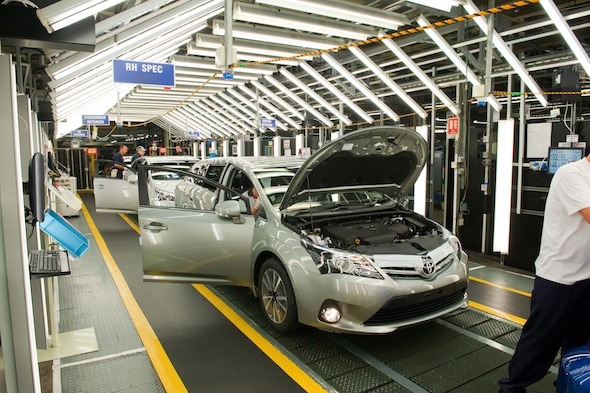
In the manufacturing world, the Andon cord obligates anybody who spots a problem to stop production. Anybody.
Andon cords are a part of the Toyota Production System. The Andon cord is a simple rope that extends the length of the production line. (Black/yellow cords in the picture above) Pulling the rope stops production. Toyota not only empowers operators to pull the Andon cord, it obligates them to do so when they spot a problem.
Your business (probably) doesn’t build cars. It may not even build a physical product. But, every company produces something. So, production means everything related to how your company makes that something. And, operators are the people in your company who make the something.
Your business (probably) doesn’t have a cord running the length of the building. But does it empower, even obligate, you to pull a virtual Andon?
For Your Project Team
What happens when you find a problem on your team? Can you pull the cord? Maybe that means a conversation with a team member or your lead. Maybe you raise a concern during stand-up or call a team meeting. Does everyone on the team feel safe pulling the cord? Is it automatic?
Can you pull the cord for a team member? Do you feel obligated to stop your team member, your lead, your manager, if you detect they are having a problem? Maybe they arrive late to meetings. Maybe they need an intervention? “You seem stressed out, can I help?”
For Your Project
You may not be as familiar with other teams on your project. But, pulling the cord for the project is very similar to pulling the cord for your project team. It’s a little more intimidating. It’s a little harder to know you are right. But it’s every bit as important. Their quality is your quality. Their product is your product.
For Your Company
As we wander away from production, the metaphor of the Andon cord gets blurry. Anything with a product has the same rules, like the recruiting team or a social team.
Still, company practices and policy can impact the product. Proposals and quotations can impact the team’s ability to deliver products on time, on budget, or of acceptable quality. Work estimates can affect morale, quality, and profit or erode client confidence.
For Your Client
Empathy is key. They value our skills and domain knowledge for the success of their product. They are not experts in our domain, so we must be respectful, patient, and empathetic. We want both organizations to be successful. There may be decisions they are unwilling or unable to make. How we present information and frame decisions is important. Are we speaking their language or ours? Can we prompt a course of action (like a doctor) rather than presenting a list of options? (like a waiter)
It’s not always clear to a client when they are impacting production. Time to stop and have a difficult conversation.
Is there a wrong time to pull the Andon Cord
Pulling the Andon cord has immediate impact. It stops production. Obligating the operators gives them responsibility for improving quality and reducing waste. It can also invite abuse. Pulling the cord for personal or political gain is never acceptable. Pulling the cord for petty or inconsequential issues diminishes the impact. It also damages the reputation of the operator or the team.
Pulling the cord is not an invitation to insert ourselves into every conversation. It’s fine to have an opinion, but find the best forum to share them. Is it worth stopping production or is it a broken window?
What’s Next
Are you empowered, even obligated, to pull the Andon cord on your team? On your project? At your company? For your client?